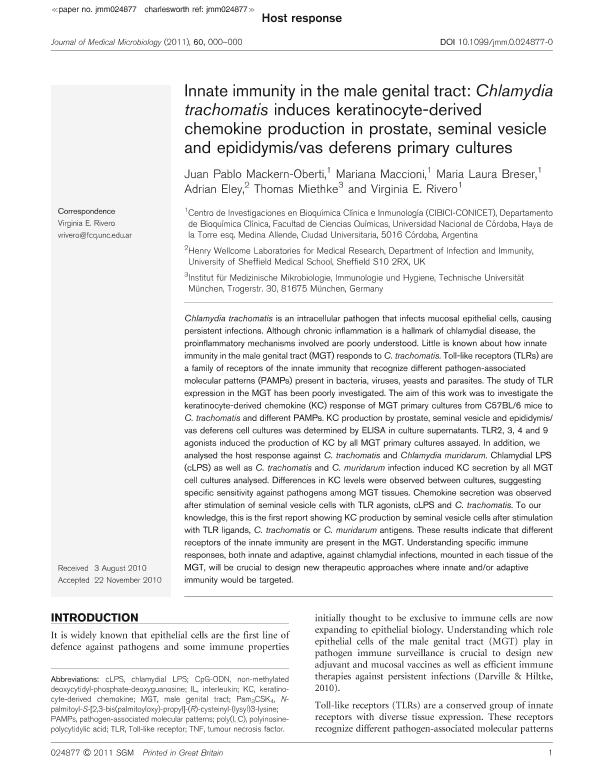Mostrar el registro sencillo del ítem
dc.contributor.author
Mackern Oberti, Juan Pablo

dc.contributor.author
Maccioni, Mariana

dc.contributor.author
Breser, Maria Laura

dc.contributor.author
Eley, Adrian
dc.contributor.author
Miethke, Thomas
dc.contributor.author
Rivero, Virginia Elena

dc.date.available
2019-07-25T21:53:35Z
dc.date.issued
2011-03
dc.identifier.citation
Mackern Oberti, Juan Pablo; Maccioni, Mariana; Breser, Maria Laura; Eley, Adrian; Miethke, Thomas; et al.; Innate immunity in the male genital tract: Chlamydia trachomatis induces keratinocyte-derived chemokine production in prostate, seminal vesicle and epididymis/vas deferens primary cultures; Society for General Microbiology; Journal Of Medical Microbiology; 60; 3; 3-2011; 307-316
dc.identifier.issn
0022-2615
dc.identifier.uri
http://hdl.handle.net/11336/80339
dc.description.abstract
Chlamydia trachomatis is an intracellular pathogen that infects mucosal epithelial cells, causing persistent infections. Although chronic inflammation is a hallmark of chlamydial disease, the proinflammatory mechanisms involved are poorly understood. Little is known about how innate immunity in the male genital tract (MGT) responds to C. trachomatis. Toll-like receptors (TLRs) are a family of receptors of the innate immunity that recognize different pathogen-associated molecular patterns (PAMPs) present in bacteria, viruses, yeasts and parasites. The study of TLR expression in the MGT has been poorly investigated. The aim of this work was to investigate the keratinocyte-derived chemokine (KC) response of MGT primary cultures from C57BL/6 mice to C. trachomatis and different PAMPs. KC production by prostate, seminal vesicle and epididymis/ vas deferens cell cultures was determined by ELISA in culture supernatants. TLR2, 3, 4 and 9 agonists induced the production of KC by all MGT primary cultures assayed. In addition, we analysed the host response against C. trachomatis and Chlamydia muridarum. Chlamydial LPS (cLPS) as well as C. trachomatis and C. muridarum infection induced KC secretion by all MGT cell cultures analysed. Differences in KC levels were observed between cultures, suggesting specific sensitivity against pathogens among MGT tissues. Chemokine secretion was observed after stimulation of seminal vesicle cells with TLR agonists, cLPS and C. trachomatis. To our knowledge, this is the first report showing KC production by seminal vesicle cells after stimulation with TLR ligands, C. trachomatis or C. muridarum antigens. These results indicate that different receptors of the innate immunity are present in the MGT. Understanding specific immune responses, both innate and adaptive, against chlamydial infections, mounted in each tissue of the MGT, will be crucial to design new therapeutic approaches where innate and/or adaptive immunity would be targeted.
dc.format
application/pdf
dc.language.iso
eng
dc.publisher
Society for General Microbiology

dc.rights
info:eu-repo/semantics/openAccess
dc.rights.uri
https://creativecommons.org/licenses/by-nc-sa/2.5/ar/
dc.subject
Male Genital Tract
dc.subject
Chlamydia Trachomatis
dc.subject
Innate Immunity
dc.subject
Cytokines
dc.subject.classification
Inmunología

dc.subject.classification
Medicina Básica

dc.subject.classification
CIENCIAS MÉDICAS Y DE LA SALUD

dc.title
Innate immunity in the male genital tract: Chlamydia trachomatis induces keratinocyte-derived chemokine production in prostate, seminal vesicle and epididymis/vas deferens primary cultures
dc.type
info:eu-repo/semantics/article
dc.type
info:ar-repo/semantics/artículo
dc.type
info:eu-repo/semantics/publishedVersion
dc.date.updated
2019-06-10T21:23:29Z
dc.journal.volume
60
dc.journal.number
3
dc.journal.pagination
307-316
dc.journal.pais
Reino Unido

dc.journal.ciudad
Londres
dc.description.fil
Fil: Mackern Oberti, Juan Pablo. Universidad Nacional de Córdoba; Argentina. Consejo Nacional de Investigaciones Científicas y Técnicas. Centro Científico Tecnológico Córdoba. Centro de Investigaciones en Bioquímica Clínica e Inmunología; Argentina
dc.description.fil
Fil: Maccioni, Mariana. Universidad Nacional de Córdoba; Argentina. Consejo Nacional de Investigaciones Científicas y Técnicas. Centro Científico Tecnológico Córdoba. Centro de Investigaciones en Bioquímica Clínica e Inmunología; Argentina
dc.description.fil
Fil: Breser, Maria Laura. Universidad Nacional de Córdoba; Argentina. Consejo Nacional de Investigaciones Científicas y Técnicas. Centro Científico Tecnológico Córdoba. Centro de Investigaciones en Bioquímica Clínica e Inmunología; Argentina
dc.description.fil
Fil: Eley, Adrian. University of Sheffield Medical School; Reino Unido
dc.description.fil
Fil: Miethke, Thomas. Universitat Technical Zu Munich; Alemania
dc.description.fil
Fil: Rivero, Virginia Elena. Consejo Nacional de Investigaciones Científicas y Técnicas. Centro Científico Tecnológico Córdoba. Centro de Investigaciones en Bioquímica Clínica e Inmunología; Argentina. Universidad Nacional de Córdoba; Argentina
dc.journal.title
Journal Of Medical Microbiology

dc.relation.alternativeid
info:eu-repo/semantics/altIdentifier/url/https://jmm.microbiologyresearch.org/content/journal/jmm/10.1099/jmm.0.024877-0
dc.relation.alternativeid
info:eu-repo/semantics/altIdentifier/doi/http://dx.doi.org/10.1099/jmm.0.024877-0
Archivos asociados
